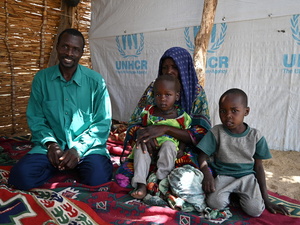Chadians fleeing Libya return to oasis of calm
Chadians fleeing Libya return to oasis of calm

Thousands of Chadians have arrived back in Faya, northern Chad, after fleeing Libya.
FAYA, Chad, April 18 (UNHCR) - Thousands of Chadians have returned to northern Chad after fleeing the unrest in neighbouring Libya and braving a long journey through one of the most hostile terrains on earth.
The UN refugee agency has registered more than 4,500 Chadians who arrived in Faya in northern Chad since March 28. Authorities who control the border post believe that up to 8,000 people have passed through this oasis town in the last month. Some 300 are still arriving every day, and thousands more are believed to be on their way.
"We are happy to be back in Chad, but we have lost everything," said Hamdan Yaya Abakar, a 40-year-old who had been working in Libya. "In Tripoli I was selling bricks and making other small trade. When the trouble started, many Chadians were arrested. I spent seven days in prison before I could escape. Then I fled with my brothers."
Others said they fled violence, intimidation and harassment in the Libyan towns of Benghazi, Sebha and Kouffrah.
Within Libya, Hamdan's convoy had to cross several road blocks where passengers were robbed of most of their money and goods. Many also said they were beaten or harassed by Libyan rebels or bandits, as Chadians were openly suspected of being mercenaries paid by the Libyan government to counter the uprising.
Under the scorching sun, they endured three weeks or more of an uncomfortable journey on rickety trucks, perched on top of heaps of luggage, jerry cans and rolled-up mattresses. They travelled 1,000 km to reach the safety of their own country, crossing parched landscapes in the Sahara desert with only a few jerry cans of water. Some took a detour through Niger to avoid a mined area in northern Chad, entering Chad through the western town of Zouar. Smaller groups entered through eastern Chad via Ounianga Kebir in the Ennedi region.
Every day, more trucks pull into Faya, unloading famished and exhausted passengers in this hitherto sleepy town of 2,000 people. The challenge is to avoid congesting and straining the extremely limited local structures and capacity.
The UN refugee agency was one of the first to respond to this growing wave of returning Chadians. It sent trucks with tents, plastic sheets and jerry cans from its field office in Bahai, about 800 km to the south-east near the Sudanese border. A team of seven staff was deployed to open a registration centre that fills up for hours with each arriving truck.
Most returning Chadians are living with local families or in public buildings. Some others squat with their meagre belongings at the edge of the town. A transit camp is currently being prepared with tents, food and sanitation facilities.
The Chadian Ministry of Social Affairs has put up some emergency tents and distributed food. Prices of basic commodities such as rice and bread have almost doubled, as has the price of private transportation.
Most of the "returnees" come from other parts of Chad, such as Kanem, N'Djamena, Ouaddai, Bol and Bar-el-Ghazel. Almost half of them are believed to have already left town, carrying on to their final destination. The International Organization for Migration (IOM) is organizing onward transportation for the most vulnerable individuals by road or by air.
While the vast majority of arrivals in Faya are Chadian young men who were living and working in Libya, there are now an increasing number of Chadian women and children fleeing as the situation in Libya deteriorates.
Among the arrivals are a few cases of Sudanese refugees from the Darfur region registered in Chad, and one asylum-seeker. No Libyan refugees have been registered so far, but the Chadian authorities have identified two sites near Faya in anticipation of possible refugee arrivals.
There are also some third country nationals from Cameroon, Côte d'Ivoire, Mali and Sudan, whom IOM will assist home upon request.
By Delphine Marie in Faya, northern Chad












